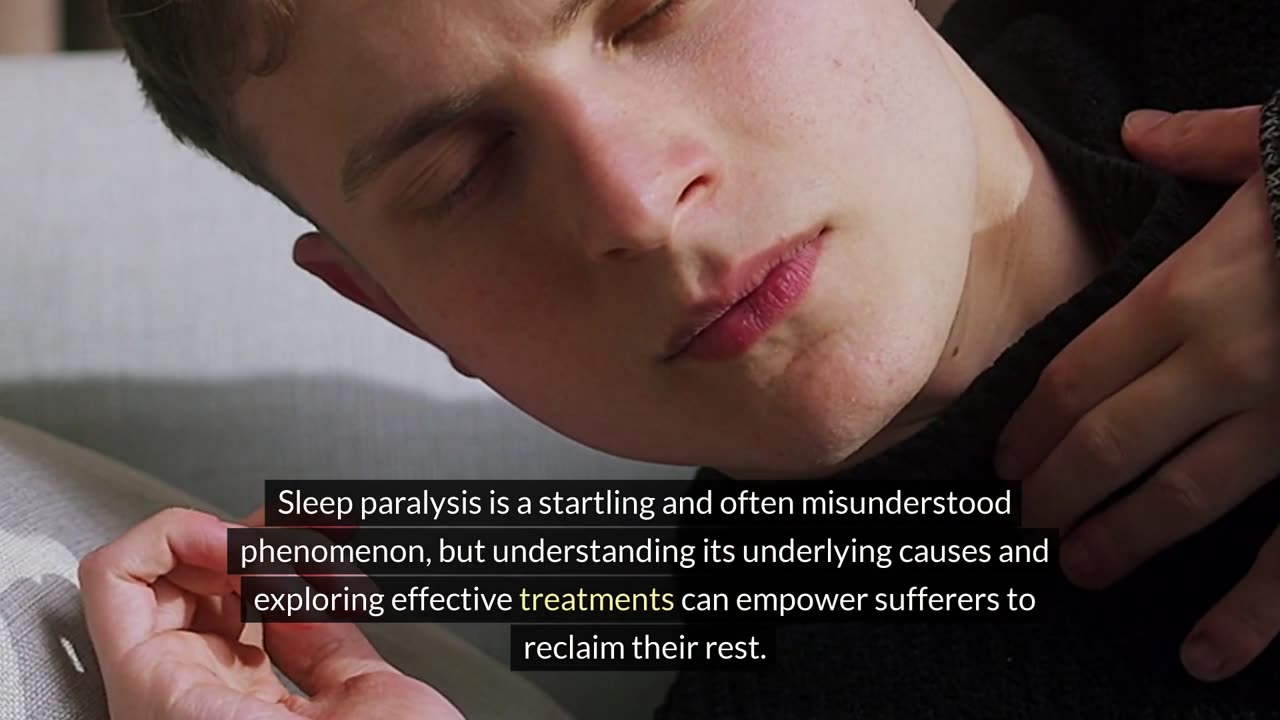Premium Only Content

the Mysteries of Sleep Paralysis
Paralyzed in the Night: Unraveling the Mysteries of Sleep Paralysis
A Terrifying Awakening**
Imagine waking up to a world where you are conscious but cannot move, speak, or scream—frozen in your bed while experiencing intense hallucinations. This nightmare scenario is a reality for those experiencing sleep paralysis, a perplexing sleep phenomenon that has mystified scientists and terrified sufferers throughout history. In this article, we delve into the enigmatic world of sleep paralysis, exploring its causes, symptoms, and the modern approaches to managing and understanding this disturbing condition.
---
The Phenomenon of Sleep Paralysis**
**Hook: When the Nightmares Escape Your Dreams**
Sleep paralysis occurs at the crossroads between wakefulness and sleep, where the mind remains aware while the body shuts down for rest. This chapter explores what sleep paralysis is, the biological mechanisms behind it, and why some people experience it while others do not. Discover the science of disrupted REM cycles and how they contribute to these frightful awakenings.
Historical and Cultural Interpretations**
* Ancient Nightmares and Modern Theories**
For centuries, cultures around the world have interpreted sleep paralysis through the lens of supernatural encounters and otherworldly visitations. This section looks at how historical perceptions align with today’s scientific explanations and how these ancient stories mirror the hallucinations reported by modern sufferers.
The Hallmarks of Sleep Paralysis**
More Than Just Being Stuck**
The core symptoms of sleep paralysis—immobility, hallucinations, and the sensation of an ominous presence—are profoundly disturbing. Here, we break down the common experiences of those afflicted, including the feeling of pressure on the chest, hearing whispers, or sensing an evil figure lurking in the darkness. Learn about the psychological and physical reactions that these symptoms provoke.
Who is at Risk?**
Could It Happen to You?**
Understanding who is more likely to suffer from sleep paralysis can be crucial for prevention. This chapter discusses the risk factors such as genetics, sleep deprivation, stress, and irregular sleep patterns, offering insights into how lifestyle choices and heredity play a role in susceptibility to sleep paralysis.
### **Chapter 5: Navigating Treatment and Management**
**Hook: Finding Relief in the Shadows**
While there is no cure-all for sleep paralysis, various strategies can help manage and reduce occurrences. Explore the effectiveness of cognitive-behavioral therapy, lifestyle adjustments, and possible medical treatments like antidepressants. Gain practical advice on improving sleep hygiene and learn techniques for minimizing the distress caused by episodes.
---
Embracing the Dawn**
Despite its frightening nature, understanding sleep paralysis demystifies the experience and reduces its power to terrify. For those who experience it, knowledge and management strategies can transform their relationship with sleep. By continuing to research and discuss sleep paralysis, we can shed more light on this dark phenomenon, helping sufferers reclaim their night and dispel the terror of their nocturnal interruptions.
-
 LIVE
LIVE
ttvglamourx
2 hours ago $0.28 earnedPLAYING WITH VIEWERS !DISCORD
87 watching -
 1:21:38
1:21:38
VapinGamers
2 hours ago $0.46 earnedTools of the Trade - EP04 Of Thumbnails and Titles, What's Important? - !rumbot !music
15.9K -
![Mr & Mrs X - [DS] Trafficking Empire – How Epstein Built His Web of Wealth and Deceit:Part 1 - Ep 5](https://1a-1791.com/video/fww1/f0/s8/1/o/k/J/d/okJdz.0kob-small-Mr-and-Mrs-X-DS-Trafficking.jpg) 52:11
52:11
X22 Report
4 hours agoMr & Mrs X - [DS] Trafficking Empire – How Epstein Built His Web of Wealth and Deceit:Part 1 - Ep 5
70.1K18 -
 1:13:18
1:13:18
Wendy Bell Radio
8 hours agoPet Talk With The Pet Doc
50.8K66 -
 5:54:39
5:54:39
dieseldesigns
6 hours agoExploring Labs In the DARK! // Abiotic factor
3.69K -
 LIVE
LIVE
BBQPenguin_
5 hours agoDragonball Z - The Android Saga
131 watching -
 LIVE
LIVE
Total Horse Channel
5 hours ago2025 URCHA Futurity | Derby & Horse Show | Saturday
42 watching -
 LIVE
LIVE
DynastyXL
5 hours ago🔴LIVE: Fortnite The Comeback Stream Starts Here🎃
46 watching -
 1:38:57
1:38:57
njgaming23
3 hours agoCoffee and Morning vibes #rumbletakeover
9.52K -
 1:09:19
1:09:19
Ami's House
2 days ago $18.19 earnedWhen Defending Israel Backfires: Are We Pushing Our Last Friends Away? With Karys Rhea
181K190